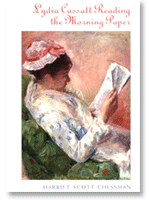 Writing came to me out of the blue. Well, out of the whitish, hazy blue,
heavy and full, of a summer’s day in Peoria, Illinois.
Writing came to me out of the blue. Well, out of the whitish, hazy blue,
heavy and full, of a summer’s day in Peoria, Illinois.This isn’t utterly accurate. Like most writers, and maybe most people, I had written often as a child, and sometimes as a person in my twenties and thirties as well. I had had yearnings to find forms for my experience; I had felt that pressure to bring something out, to give “to airy nothing a local habitation and a name.”
The important fact is, though, in spite of an occasional poem here and there, I hadn’t thought I could really write. How do you take a step over that boundary between wishing to write and writing? It seemed like some magical hedge I couldn’t walk through.
 Of course, I had always read – fiction and poetry especially. I had gained a
PhD in English at Yale University, all to hold close to words, to that shape-making; I
had relished Chaucer and Milton and Jane Austen, and a hundred more writers; I
had then taught modern British and American literature for eleven years at
Yale. Talking about literature, though, figuring out its significance, even
loving it very much, do not move you through that hedge, necessarily.
Of course, I had always read – fiction and poetry especially. I had gained a
PhD in English at Yale University, all to hold close to words, to that shape-making; I
had relished Chaucer and Milton and Jane Austen, and a hundred more writers; I
had then taught modern British and American literature for eleven years at
Yale. Talking about literature, though, figuring out its significance, even
loving it very much, do not move you through that hedge, necessarily.So – Peoria. I was visiting my grandmother, who was quite old then, and losing her memory. One afternoon, I sat in a funky Peoria motel room, bare of objects apart from the bland bed and T.V. I was disoriented and sad. My grandmother had not known who I was, she who had given me books of poetry (one signed by Robert Frost), who had driven my sister and me in her old car from Illinois to Ohio, stopping at Stuckey’s along the way, who had found a four-leaf clover once near my house in Ohio.
Out of this mix of sorrow and love, a landscape came to me, a small Ohio town like the one in which I’d grown up. This place came to me already peopled, and somehow, as I started writing notes on a piece of paper, I discovered who these people were, and what their relationships might be. I wrote for half an hour, maybe, astounded by the fact that all of this appeared to have been inside me, waiting to emerge. How could I not have known?
The readiness is all, though, as a famous Shakespeare character so beautifully put it. You read, you wish, you think, and slowly, unconsciously maybe, you gain the confidence you need to know what landscapes and figures exist inside you. You’re on the other side of the hedge then, and it is as astonishing to be there as it is to live in a gorgeous and varied country you’d only dreamed of one day visiting.
 What happened then? Oh,
the usual stuff. I had the courage to write that first novel, which developed
over the course of two years into Ohio Angels, and one day, after
myriad disappointments and frustrations, I found a publisher, a
small independent one. The publishing side of this writing business is
interesting, filled with joy and disappointment and joy again. What remains
most important to me, though, is the sensation I have whenever I open up my
computer and start to write. It’s a sense of incredibly astonishing discovery;
it’s a sense of walking through that hedge again and again. – Harriet Chessman
What happened then? Oh,
the usual stuff. I had the courage to write that first novel, which developed
over the course of two years into Ohio Angels, and one day, after
myriad disappointments and frustrations, I found a publisher, a
small independent one. The publishing side of this writing business is
interesting, filled with joy and disappointment and joy again. What remains
most important to me, though, is the sensation I have whenever I open up my
computer and start to write. It’s a sense of incredibly astonishing discovery;
it’s a sense of walking through that hedge again and again. – Harriet Chessman
Special thanks to Meg Waite Clayton (The Wednesday Daughters), on whose blog, First Books, this essay was first featured.

